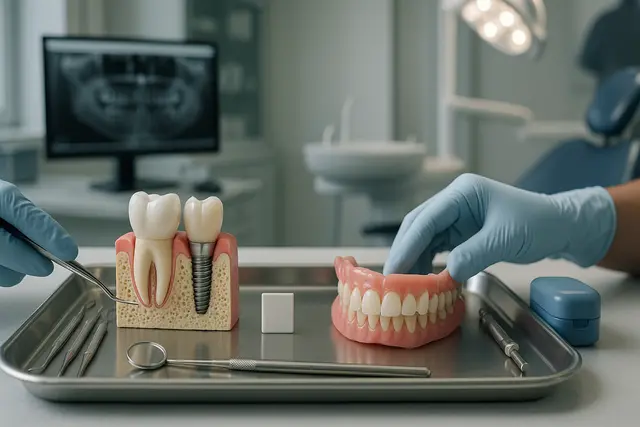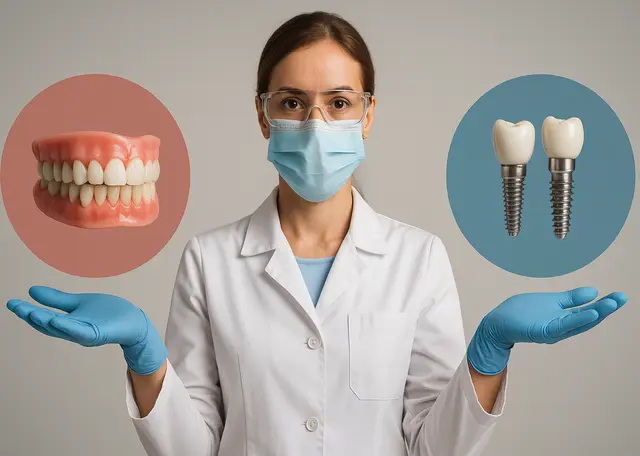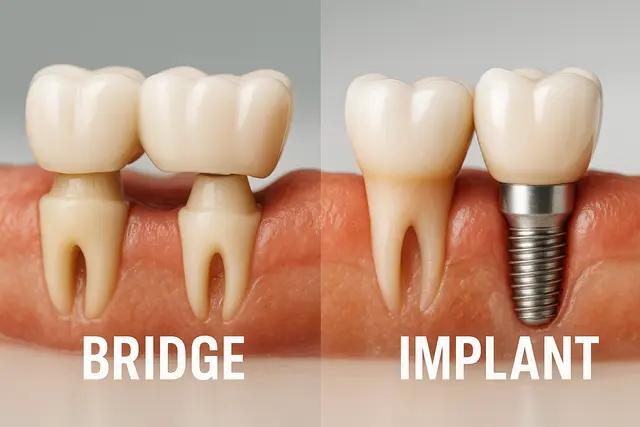Prosthodontics
4 min read
Mar 28, 2025
Dental Implant Financing: Payment Plans, CareCredit, and HSA Tips
Staring at the estimate for a dental implant can feel like you’ve just swallowed an ice cube whole, instant freeze followed by mild panic. Relax. There are more ways to pay for your dental work than scrounging through the couch cushions. In the next few minutes, you’ll learn about dental implant financing choices big and small, from plastic in your wallet to that quiet little HSA you forgot you even had. Let’s turn sticker shock into a confident grin.

Dental Implant Sticker Shock
A single tooth implant often costs more than a weekend getaway, and full mouth dental implants can rival a new compact car. Factor in the implant procedure itself, the abutment, and the crown, and the dental implant costs climb fast.
If you’re comparing a denture to an implant dentistry upgrade, remember the life‑of‑your‑loan math: an up‑front splurge may save repair bills later. The cost of dental implants varies by region and by dental implant center, but implant patients everywhere ask the same thing, “How on earth do I pay for this?”
Financing Options You Actually Understand
First stop: special financing options. Third‑party financing giants like CareCredit, LendingClub, and even your hometown credit union all compete for your smile. CareCredit (often called “care credit” in everyday chatter) is popular because the application happens right at the dental office and can feature a promotional 0% APR period.
LendingClub offers extended repayment terms that stretch the monthly payment to something less than your streaming subscriptions combined. A personal loan or a home equity loan may bring a lower interest rate, yet both require a good credit score and solid credit history. Whichever route you choose, compare APR, fees, and how long you’ll carry the debt; no one wants an implant repayment haunting them longer than the crown itself.
Dental Financing vs. Dental Loans
Some practices advertise in‑house dental financing, meaning the office carries the balance and drafts a financing plan with you directly. Others steer patients toward dental loans through major credit cards or dedicated medical‑credit companies. To qualify, lenders check credit to qualify, so polishing your credit score first can unlock better terms.
Folks with excellent credit snag the sweetest rates, while patients rebuilding credit may face steeper costs that could impact your credit score if payments slip. Pro tip: ask whether the practice reports to bureaus. If they do and you pay on time, that healthy habit may boost good credit over the life of your loan.
Dental Insurance, HSAs, and FSAs
Insurance coverage for implants is the dental world’s great maybe. Some major dental insurance riders chip in for the implant procedure, but many plans only cover the crown. Review your insurance options or switch insurance plans at open enrollment if you can.
Pair that coverage with financing and insurance strategies like using a flexible spending account (FSA) or health savings account (HSA). Swiping tax‑free dollars is a satisfying way to pay for dental expenses. Remember, FSA funds follow a use‑it‑or‑lose‑it calendar, so time the surgery wisely. Your HSA, by contrast, rolls over for life, a handy way to pay for your treatment a year or two down the line.
Affordable Dental Implants: Real Talk on Cost Control
If affordable dental and affordable dental implants sound like unicorns, try these moves: ask about a variety of payment discounts for paying cash, seek out university dentistry clinics, or schedule procedures near year‑end when get‑affordable‑dental promotions pop up. Some dental implant centers offer flexible payment options with zero interest if paid within twelve months.
Others bundle treatment options, letting you shave hundreds off the total dental expenses. Not ready for implants? A temporary denture can bridge the gap while you strengthen finances. Whatever you pick, be transparent with your dentist about budget limits, most pros would rather craft a way to pay than watch you skip needed dental care altogether.
Choosing the Right Dental Implant Center
A reputable dental implant center should outline implant financing options before you even sit in the chair. Look for clear estimates, written warranty terms, and a friendly breakdown of financing and insurance paperwork.
Ask whether they accept major credit cards, offer dental credit lines, or partner with third‑party financing. Quiz them on implant treatment timelines and how repayment fits around vacations and holidays. The right team treats financing like any other clinical step, precise, honest, and designed to keep you smiling.
Quick‑Fire Tips Before You Go
Learn about dental codes so you can check every line item.
Ask if office staff can pre‑authorize with major dental insurance to avoid surprises.
Use FSA funds first, then HSA, then credit cards, tax savings beat points every time.
Compare implant financing options annually; a refinance could lower interest rate pain.
Keep receipts related to your dental procedures; they matter at tax time.
There you have it, a straightforward guide to paying for implants without losing your sense of humor. Whether you lean on CareCredit, a personal loan, or that tidy flexible spending account, there’s a way to pay for your dental dreams that won’t wreck your budget. Smile on; you’ve got this financing thing handled.
What Are the Most Common Financing Options for Dental Implants?
Popular financing options include third-party providers like CareCredit and LendingClub, personal loans, home equity loans, and in-house dental office plans. Each has pros and cons, CareCredit may offer 0% APR if paid within a promotional period, while LendingClub spreads payments over longer terms. Personal loans usually offer lower interest rates but require good credit. Always compare fees, APRs, and repayment timelines before choosing.
Does Dental Insurance Cover the Cost of Implants?
Some dental insurance plans cover part of the cost, usually the crown, not always the implant or surgery. Coverage varies widely, so review your plan carefully or ask your provider if implants are categorized as a major procedure. Pairing insurance with HSA or FSA funds can help reduce out-of-pocket costs using tax-free dollars.
What’s the Difference Between Dental Loans and In-House Financing?
In-house financing is offered directly by the dental office, where you make payments to them over time. Dental loans come from outside lenders like banks or medical credit companies. In-house plans may offer more flexibility without a credit check, while external loans might offer better rates if your credit is strong.
How Can I Make Dental Implants More Affordable?
To lower costs, ask about cash discounts, seasonal promotions, or bundled treatment packages. Explore dental schools for reduced-cost care or consider temporary dentures while saving for implants. Use your FSA funds before they expire and tap into your HSA for tax-free payments. Most importantly, be open with your dental provider, they can often tailor a payment plan that works with your budget.
Read Next
Related Posts

Prosthodontics
Implant vs. Dentures Pros and Cons: A Deep Dive into Modern Solutions
Missing teeth can impact more than just your smile, they can affect how you eat, speak, and feel about yourself. Fortunately, modern dentistry offers two leading solutions to bring back both function and confidence: dentures and dental implants. Understanding the pros and cons of each can help you make the choice that fits your needs, lifestyle, and budget.
7 min read
Oct 17, 2025

Prosthodontics
Full Mouth Implants vs. Dentures: Which Is Better for You?
When it comes to replacing missing teeth, the choice between full mouth dental implants and dentures can be overwhelming. Each option has its own set of benefits, limitations, and long-term considerations, making it essential to understand what works best for your needs, health, and lifestyle.
5 min read
Oct 17, 2025

Prosthodontics
Tooth-Supported Bridge vs. Implant Comparison: Benefits, Drawbacks, and Insights
Deciding between a dental bridge and a dental implant can feel overwhelming, especially when both options promise to restore your smile and improve oral function. Each solution comes with its own set of benefits, considerations, and ideal use cases, making it essential to understand how they compare before choosing what’s right for you.
6 min read
Oct 17, 2025
Don’t have time to research every dentist around you?
See why 30k+ patients trusted us